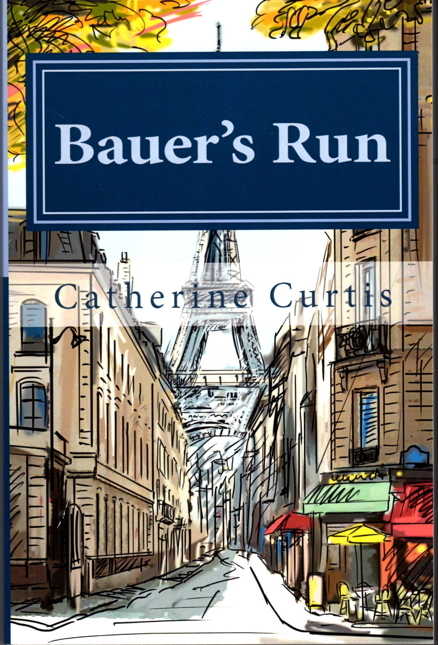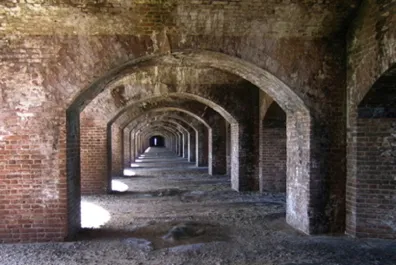Catherine Curtis has worked as an artist her entire life-in several mediums. Coming from generations of artists (actually back to a peintre ordinaire to the Sun King), she has always been interested in art and art history as well as 20th Century European and American history. These interests come together in Bauer's Run.
For the first 24 years of her adult life, she lived all over the country-moving often for her husband's job. Everywhere they went, she looked for houses to rehab and gardens to revive-an artist being challenged over and over to make a silk purse out of a sow's ear. In the early 1980's she moved to Denver to stay. With her husband she bought a tiny house on a big lot and settled in to change both. The tiny house is now large with room for a bright studio to paint in, and a library in which to spend hours writing. The garden has gone from arid and boring to delightfully overgrown with many trees.
Along the way, the voracious reader got interested in writing a book about all the art that disappeared into the hands of the Nazis in WWII. "Bauer's Run" was born along with a joy of writing. In order to hone the craft of writing, she joined Rocky Mountain Fiction Writers (and a critique group) as well as International Thriller Writers.
Writing, for Catherine is a bit like rehabbing a house or a garden. You start with a plan. Very soon, you can see your plan, and your characters begin to change and do unexpected things. Rather like a garden where you might plant a special species with pride and anticipation. Sometimes it works beyond your wildest dreams . . . and sometimes it doesn't.
Catherine feels blessed with a wonderful life. She travels the world outside this country but always comes home to the same place-a lovely place of refuge and peace where she can write of nefarious deeds! Now she is at work on her next book.
Bauer's Run
Synopsis
Bauer's Run is an historical thriller set in Europe, the U.S., and Israel between 1944 and 1995.
A highly placed Nazi officer escapes from Berlin in the last summer of the war-taking with him a large truckload of stolen art and gold. Making his way to Zurich, he leaves no witnesses.
With the help of an uncle (the director of a private bank), a surgeon (for a new face), and a naive American girl with an illegitimate child, he forges a new identity as Wolfe Bauer.
Wolfe marries the girl (Renee) and raises her son (Mark) as his own. Through conniving, blackmail, and murder, he works his way up in the Swiss banking world.
Mark grows up a child of privilege between Wolfe and his wealthy American grandparents. Ironically, at University he is drawn to art and art history and his best friend is a Jew who survived the camps.
While teaching at the Sorbonne, Mark establishes an archival trust to locate and return art stolen by the Nazi's. The work drives a wedge between father and son while gaining Mark an international reputation as being on the side of the angels.
As Wolfe's heir, he discovers his legacy of murder, stolen art and gold. He must find a way to return Wolfe's ill-gotten gains to the rightful owners while shielding his family from knowledge of his father's war crimes.
He must also protect them from Wolfe's Nazi and Arab confederates who will kill to acquire the fortune the cache represents.
Does Mark have the strength to do what is right-to make restitution regardless of risk? Who will come out from the shadows of the distant past to threaten his life and lay claim to the long-lost fortune?
Mark will have to rely on his own creativity and that of like-minded friends to keep his family and himself safe.
Bauer's Run
Chapter 1
The deep growl of a truck engine in low gear preceded the lorry as it rolled slowly into Berlin's blacked out Friedrichstrasse. Black cloth with just a slit permitted only a narrow beam of light to escape from the headlamps. Fog and misty, light rain swirled in the weak beams as the lorry rolled quietly along the street. The truck drew to a stop near the end of the block. Most of the prosperous-looking houses were boarded up, all were dark. Only an occasional window was seen on the upper floors; there was no light to be seen in any.
No movement came from the truck for several minutes after the engine was shut off. It sat as a great beast, waiting in the dark. The passenger side door opened quietly. A tall man stepped out. His face was not visible in this moonless night, but he carried himself well and moved quickly to the door of the nearest house. He stood for just a moment, turning his face to the sky. It would not clear tonight. The low, heavy cloud layer and rain meant no bombing. Odd that the weather brought respite from the bombs for city dwellers but sheer misery for the troops out in it. Shaking his head, he tore down a paper attached to the door and disappeared inside.
In a partially shuttered window across the street, two men came alert at the appearance of the lorry. Both moved even closer to the window. The older of the two Arabs, an Egyptian, raised a pair of glasses to his eyes and strained to make out a face in the dark street. The fatigue of the long watch showed only in his shoulders. Now the younger man eagerly shifted his weight from foot to foot in anticipation. The boy had no patience. He alternately paced, drank endless cups of coffee and reread the few documents spread out on the table.
A few moments later, the tall man stepped out of the door of the house and motioned to the driver. The driver slipped out of the cab of the truck and walked to the rear, then opened the canvas and climbed up inside. In just a few short seconds, a small, wiry man was rudely shoved out the back, barely landing on his feet. The man looked bewildered in his striped, oversized pajamas that identified him as a prisoner. Laughing, the driver was brought up short by a terse order from the tall officer who stood by the door of the house.
"Silence you idiot! Hurry."
The three men entered the house and closed the door behind them. As the tall man switched on a lamp in the entrance hall, his once handsome face was cast into a caricature of horror. A jagged scar coursed down the side of his face from brow to chin like a wandering country stream. His ice blue eyes dared any to pity him. Close-cropped brown hair and squared shoulders told of a lifetime of discipline. His worn but spotless officer's tunic was tailored for him. An iron cross hung from a silver chain around his neck. The creases in his pants were sharp as a knife, even in the dampness. There was no doubt who was in charge. The driver took his tongue lashing in silence, eyes down cast, fists clenched.
The officer took a moment then to read the paper he had torn from the door; this house had been confiscated for the Reich. The penalty for entering was death. A sound somewhere between a snarl and a laugh escaped his mouth as he wadded the paper and threw it to the floor.
Now the driver and his charge, whose family had lived in this beautiful house for generations, made many trips up and down the stairs. Each time they brought up crates as carefully as one would carry a child. Soon the large entry hall was so full of crates it was nearly impossible to turn around. The officer stood silently, cataloging each crate in a small blue book he held in his hand.
On the last trip up the stairs the driver once more risked his superior's wrath. He was tired, and tired of the officer's stony silence. Laughing, he planted his foot into the backside of his charge, sending the old prisoner sprawling to the floor. The crate the man was carrying, the very last one, split open on impact. The officer bent and retrieved the precious Van Gogh that spilled out, now ripped beyond repair. Anger flashed only momentarily in his eyes before they went stone-cold again. Without a word, he snapped off the light and slipped out the door to observe the street.
He stood there a moment in the dark, calming his anger and steadying his nerves. When he stepped back inside, he said, "Quickly now, this is the last, get them loaded."
He once more stood watch as the others did the work. When the last package was secured in the back of the truck, the prisoner walked hesitantly up to the officer.
"Please Sir may I look just one last time at the house?"
The officer gave a twisted smile as he replied, "It's just Horst, Jacob. Of course you can. Do you think we are barbarians? It won't be long now. When this war is over, you and your family will return to live in this house as you always have."
As the man walked past him into the house, the officer gave an abrupt nod to the driver. Moving quickly now, the driver pulled a pistol from his blouse and unceremoniously shot the prisoner in the back of the head. He turned to the officer with brutal satisfaction in his voice, "Well, that ends that."
Horst nodded his head; "It does indeed."
A puzzled look and then terrified comprehension crossed the driver's face in the split second before the officer raised his Luger and shot him in the face.
Horst moved quickly then. He removed the dead man's blouse and exchanged it for his own, put his own watch on the driver's wrist and a silver chain and medallion around the dead man's neck.
Across the street, the man watching nearly dropped his glasses in shock. This was unexpected; his orders were only to watch. He instructed the boy with him to get his bicycle and deliver a message as fast as he could.
"Carefully Hamid, carefully-you must not be seen. Stick to the back streets, but get to the general fast. Tell him 'the prize is moving'."
The boy had just opened the street door a crack when he heard another shot in the street and quickly closed the door. He leaned his head against the jamb and waited for the pounding of his heart to subside before he slowly opened the door again. Sliding carefully along hugging the wall of the house, he was able to turn the corner without being seen. Only then did he begin to breathe again.
The man who had been watching from the window stowed the glasses in his coat and gathered up the documents strewn on the table. When he was confident there was nothing left behind to identify him, he extinguished the small light and moved toward the door.
Across the street, the officer reached into a small alcove behind the door and returned with a much worn shotgun. Jacob must have used this for birds. Using a single shell at point-blank range, he obliterated the driver's face. I wonder if I will ever feel anything again. I wonder if I will ever care about anything again.
Bauer's Run
Chapter 42 (excerpt)
…
Mark was watching from the roof of a building across the street when the moving truck arrived. The driver was early; he was going to have to wait while he scanned the street behind and all around for any sign that the truck had been followed. After ten minutes, Mark ran lightly down several flights of steps and out the back door of the building on whose roof he spent the last hour. His car was several blocks away and he reached it shortly. He drove the few blocks and pulled to a stop in back of the moving truck.
"I see you were able to find the place. Have you been here long?" "Only a few minutes. Where do I need to park to unload?" "We'll just ring the bell for the watchman to open the overhead door and you can drive right in. There's an elevator to the floor where the cargo will be stored."
Soon the truck was driven inside and the door closed again. The large freight elevator would hold a lot, so the driver, who enlisted the help of the watchman to operate it, soon was moving boxes and furniture quickly. This was the night he would get to spend in Montmartre without his wife being the wiser. When he was finished, the man whose household goods he moved tipped and thanked him. Neither the tip nor the thanks were lavish enough to be remembered the next day.
The watchman, an old retired Surete man, who had known Mark for years, helped him set the alarms and lock up. Mark now had other arrangements to look after. Over the next ten days, the household goods moved into the loft of this old warehouse building would be moved three more times. Each time, different sets of people were involved. The third and final time, they were brought to a cellar many levels below the street. An elderly man met the truck and opened the large doors into the courtyard and closed the doors behind the truck. The truck was unloaded into the courtyard and the driver left, happy to not have to carry everything up or down stairs into what was obviously a very old building.
Mark was the next person to arrive. He carefully unpacked several boxes and crates and each new treasure was carried very carefully down the stairs to a temperature-controlled room where several people were working over canvasses of many sizes and ages. Before long, the attention of most of the staff members drifted away from their own work to what was just coming in.
The staff had been there a long time and was very trusted. None who had not proven himself over and over again ever got to see this part of the museum. One who could not be trusted to keep his mouth shut ever even heard of the cellar projects. The curator was a friend of Mark's for many years. There had been many times that he came to the old curator for help with stolen art. The man, whose sister was married to a Jew who was arrested and taken away from his home and never heard from again, was very sympathetic to Mark's efforts to return property. It was he who taught the young Mark the accepted ways to establish provenance. The elderly man walked slowly, and with a cane now, as he looked over the collection the younger man brought him.
"This is a great thing you are doing, Mark. The museum will keep the works safe as you look for their owners. I suppose you are still not ready to tell me where you found them?"
"No, my friend-not now, not ever. I care too much for your safety."
"I am an old man, Mark. Safety means much less to me than satisfying my curiosity."
Mark laughed, "Even so, my old friend, you will have to stay curious this time."
…






